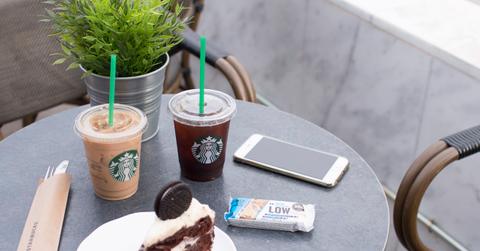Starbucks Is Offering $10 Million To Come Up With A Compostable Cup Design
Starbucks has been working to find a solution to their coffee cup waste issue. Now, they're letting the public help.
Updated March 11 2020, 10:44 a.m. ET
Single-use plastic has been singled out as an enormous issue when it comes to unnecessary waste, particularly runoff into ocean waters that damages marine health, and eventually enter our drinking water. A hidden use of plastic many consumers don't consider is the prevalence of single-use paper cups. Many people mistakenly believe the cups they drink their coffee out of are recyclable, but actually, they're lined with a thin layer of plastic to keep them waterproof. Most recycling facilities don't have the bandwidth to remove this plastic lining, and so the cups end up in the regular waste cycle.
Starbucks is working with Closed Loop Partners and its Center for the Circular Economy, an organization that promotes recycling and the development of sustainable consumer goods. In a press release, they cite the statistic that worldwide, 600 billion paper and plastic cups are distributed each year. Starbucks claims their company on counts for one percent of that—but that's still 6 billion cups. Annually. However, they are trying to encourage some innovation that might solve the problem.
The NextGen Cup Challenge is a contest that offers $10 million to the person or group that can develop a compostable coffee cup.
"Through this partnership, the Challenge will enable leading innovators and entrepreneurs with financial, technical, and expert resources to fast-track global solutions, help get those solutions to shelf, through the recovery system and back into the supply chain" said Rob Kaplan, managing director of Closed Loop Partners.
The Starbucks Research and Development team is currently working to solve the challenge themselves, by developing a liner for a cup that could be biodegradable. They say they are currently testing a model made in part from plant-based materials, but it has to meet the standards of health and safety inspectors for serving hot liquid. The cups the company currently uses are made from 10 percent post-consumer recycled fiber, and can be recycled in a few select facilities with the capability to do so. But it's more realistic to design a better cup than to upgrade every recycling facility around the world.
A big company likes Starbucks making a change in their production line can have a chain effect on consumer waste. Dunkin' Donuts recently announced they were finally giving up their polystyrene foam cups, with a deadline to fade them out completely by 2020. McDonalds has also committed to making more of their consumer products from recycled materials. This challenge may be the push needed to find a technical solution to the coffee cup disposal problem
“Developing a plant-based liner that stands up to hot liquids and is commercially viable is incredibly hard, but we believe the solution is out there, not just for cups but for other exciting applications, like making straws greener, in the future,” said Rebecca Zimmer, director of global environmental impact.
But until that solution is developed, consider getting a reusable to-go mug!
